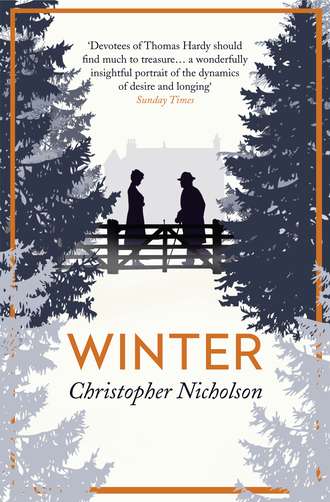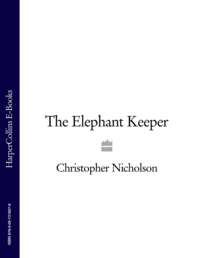
Полная версия
Winter
Lying here I wonder what the first wife did. How active was she? Did she stay silent or utter sounds, either voluntary or involuntary? The vision of them rises before me in the darkness, she with her waxy uneven flesh, he with his scrawny legs, exchanging kisses and caresses on this very bed; they writhe (a horrible word) and her fat thighs widen as he pushes into her. A repulsive expression of greedy pleasure spreads over her face. What is this? I am not jealous, I refuse to be even slightly jealous of something that perhaps never happened, a lurid concoction of my imagination. Besides as I haste to remind myself it is perfectly possible that their physical relations were largely non-existent. I also haste to remind myself that love not sexual relations is the true foundation for a successful marriage and that they did not love each other, whereas my husband and I certainly do, do love each other, that there can be no doubt of, of that there can be no doubt.
CHAPTER III

As November progressed, fears about the forthcoming dramatic production began to trouble the old man more than a little. Had he been entirely wise to have agreed to its performance? For years, he had carefully fended off requests from theatrical managers near and far to stage the novel. That he had at last given way was to some degree a reflection of his age, for if he was ever to see the play performed, now was the time; but also instrumental in his decision had been his fervent desire to see Gertie as Tess. He had stipulated that the production was possible only if she were involved. ‘I do not think anyone else capable of playing the part,’ he had told Tilley.
On the night before the first performance he woke and fretted to himself in the darkness. Gertie would be perfect, of that he had not the least doubt, but the acting talents of the other men and women in the cast were greatly inferior. Considering them one by one, his misgivings increased. He was particularly concerned about the part of Alec, who in the absence of anyone more suitable was to be played by a gawky young man called Norman Atkins, who worked behind the counter in one of the town’s banks.
Of course – he reminded himself – it was merely an amateur production, one which could not be fairly judged by professional standards. Yet interest in the play had been enormous, and leading newspaper reviewers from London had promised to be at the Corn Exchange.
The old man was not nearly as indifferent to the play’s reception as he pretended to be. More than forty years had passed since his first novels, and while he had forgotten all the good reviews the bad ones stuck in his memory like thorns. Ignorant, insensitive, malicious, they still pricked and festered. The very idea that ‘Tess’, his dearest creation, might be subject to any criticism, even of the mildest kind, kept him awake for hours.
At breakfast, with rain driving against the windows of the dining room, he was in a gloomy frame of mind. ‘I am afraid it may be a mistake.’
‘Why?’
He gave a shrug.
‘I’m sure it’ll be a great success. Where is the mistake? I’m sure it will be a success.’
‘I have no great expectations.’
‘I’m sure it’ll go well,’ she insisted. ‘I just wish Cockerell was coming.’
‘Cockerell is coming tomorrow.’
‘Who else will be there? Will Lawrence be there?’
‘Tonight? He may not be able to get away. But Cockerell is coming tomorrow, to both performances.’ He frowned. ‘Maybe no one’ll come.’
‘Thomas, of course they will. All the tickets have been sold. You do say some ridiculous things sometimes.’
There was a silence in which he wondered whether he might sit back-stage. He liked the thought of being out of sight, watching the actors shuffle on and off. Perhaps he would get a chance to talk alone to Gertie, though she would be on stage for almost the entire time.
‘All I hope,’ said his wife, ‘is that it doesn’t go on too long afterwards. Poor little Wessie. I hate leaving him alone.’
‘The maids’ll look after him.’
‘They don’t even try to understand.’
‘He’ll be all right,’ the old man said dismissively, though he agreed with her.
He departed the breakfast table in an altogether better mood than had been the case when he sat down. Yet, as the morning went on, his disquiet returned.
Although the town was not quite the provincial backwater that it had been half a century earlier, it remained a place somewhat removed from the main currents of thought that flowed through the big cities. Conservative habits of mind prevailed, particularly in relation to moral behaviour. This was where the problem lay with ‘Tess’. Conventional morality asserts that, in the conclusion to any work of art, the author should reward the good and punish the bad, and the novel signally failed to adhere to this long-established practice. And rightly so, in the old man’s opinion; when one surveyed human affairs there seemed to be no automatic presumption in favour of the triumph of the good. Lives did not always end well, and it seemed dishonest to pretend otherwise. The fate of Tess was to be hanged, despite her essential innocence. In an attempt to soften the blow – and with more than half an eye to the difficulties of staging the scene satisfactorily – he had removed the hanging from the play and made it end at Stonehenge. Still, the story remained a tragic one, and whether it would be to the taste of the town he could not say.
Perhaps as difficult was the fact that the story implicitly criticised the hallowed institution of marriage, on which some authorities claim the stability of society to rest.
The dreariness of the meteorological conditions did nothing to raise his spirits. There are November days that begin with rain, but the wind hurries along the clouds and by noon the sun is shining from a blue sky; and then there are days when the rain sets in early and never lets up, much like a dog attached to a bone. This was one such. The wind stiffened and swung to the north, and the afternoon brought a succession of squally hailstorms, with white stones bombarding the house and bouncing on the green sward of the lawns. It was the first proper taste of winter, and altogether common sense might have said that it was a day to stay at home by the fire, not to venture abroad. Watching the barrage of hail the old man vaguely asked himself whether he might contrive to miss the performance at the Corn Exchange.
Here he was not in the least serious. If someone had come and forbade him from attending the play, he would have been deeply aggrieved. In truth, what he had begun to dread most was not the play itself, but the prospect of meeting so many people before and after the performance. He had always disliked large social gatherings, preferring those of a more intimate kind.
As the evening drew nigh, he went to his bedroom and began to change into the appropriate apparel. Dressing and undressing always took him some time nowadays, not least because his fingers were stiff, but now he found himself in a paroxysm of indecision with regard to the suit. He had three decent suits: one plain dark, the second a pin-stripe, the third a Norfolk tweed. Florence had laid them out on the bed. The tweed would possibly be too hot, the dark suit seemed too funereal, while the pin-stripe was a little worn. Why had he not thought of this before?
The old man had spent much of his life contemplating the great issues of the world, against which matters of dress were utterly trivial. Yet, as the originator of ‘Tess’, all eyes would be upon him, a prospect he disliked intensely. He stood and dithered in his shirt and socks.
Florence entered the room.
‘Voss is here,’ she announced.
‘Already? What time did you tell him?’
‘Six thirty. He’s half an hour early.’
‘Then he will have to wait. I’m not hurrying. We don’t want to get there early.’
‘I know, but we mustn’t be late.’
‘We won’t be late.’
She sighed. ‘I almost wish we weren’t going.’
She spoke in such a heartfelt tone that he turned to regard her. She wore a long evening dress, dark blue in colour; it hung off her like a voluminous curtain; and her face was full of anxiety. It struck him that this would be her first appearance in public since her operation.
‘Is something wrong?’ She put a hand to her neck. ‘What are you looking at?’
‘Nothing at all. But, you know,’ he said solicitously, ‘there is no need for you to come. If you want, you can stay.’
‘O, Thomas, I couldn’t possibly. What would people think? I have to come.’
‘It’s not worth exhausting yourself for. Merely a short play – why not stay and keep Wessex company? You can come to the matinée tomorrow with Cockerell,’ he added, knowing how well she and Cockerell got on together.
‘No, I have to come tonight,’ she said in an impassioned voice. ‘I have to. I must come.’
He nodded, understanding, and also relieved. Going alone he would have felt even more vulnerable.
He returned his attention to the matter of the suits.
‘You could wear the tweed,’ she suggested.
The old man chose the pin-stripe. He sat on the bed and pulled the trousers up his legs until the point came when he had to stand in order to pull them to his waist. He allowed Florence to button on the braces, but managed the tie by himself, although as he did so he regarded himself in the glass and was not much pleased by what he saw. He pressed his moustache with a fingertip, a sure sign of internal agitation. Next came the waistcoat, with Florence again doing the buttons.
‘Shoes?’
‘O yes.’
He stepped into his shoes and she knelt and did the laces.
‘I may sit backstage,’ he announced.
‘What? Why? Where am I to sit?’
‘No one will be looking at you,’ he said.
‘But I’ll be alone.’
‘O, there’ll be plenty of people.’
Down in the hall they put on their coats: his tweed, hers fur. Around her neck she wound her fox stole. Wessex watched them both, his ears flat, his spirits patently lowered at the idea of being left alone.
By ill chance, the weather had taken a sharp turn for the worse, and the rain was tumbling in sheets through the branches of the trees. With the assistance of Mr. Voss’s umbrella, the elderly couple hurried over the wet gravel to the taxi-cab.
The journey ahead was a short one, the distance being little above a mile, and after crossing the bridge over the railway line the road descended into the town. The rain beat loudly on the roof of the car, and the windscreen wipers thrashed to and fro in a furious attempt to clear the water pouring over the glass. The streets were all but empty, save for a few unfortunate pedestrians who had been caught in the downpour and who scuttled for cover. It was a miserable evening. Neither the old man nor his wife said a word, but both seemed equally unenthusiastic about what lay ahead.
Конец ознакомительного фрагмента.
Текст предоставлен ООО «ЛитРес».
Прочитайте эту книгу целиком, купив полную легальную версию на ЛитРес.
Безопасно оплатить книгу можно банковской картой Visa, MasterCard, Maestro, со счета мобильного телефона, с платежного терминала, в салоне МТС или Связной, через PayPal, WebMoney, Яндекс.Деньги, QIWI Кошелек, бонусными картами или другим удобным Вам способом.



